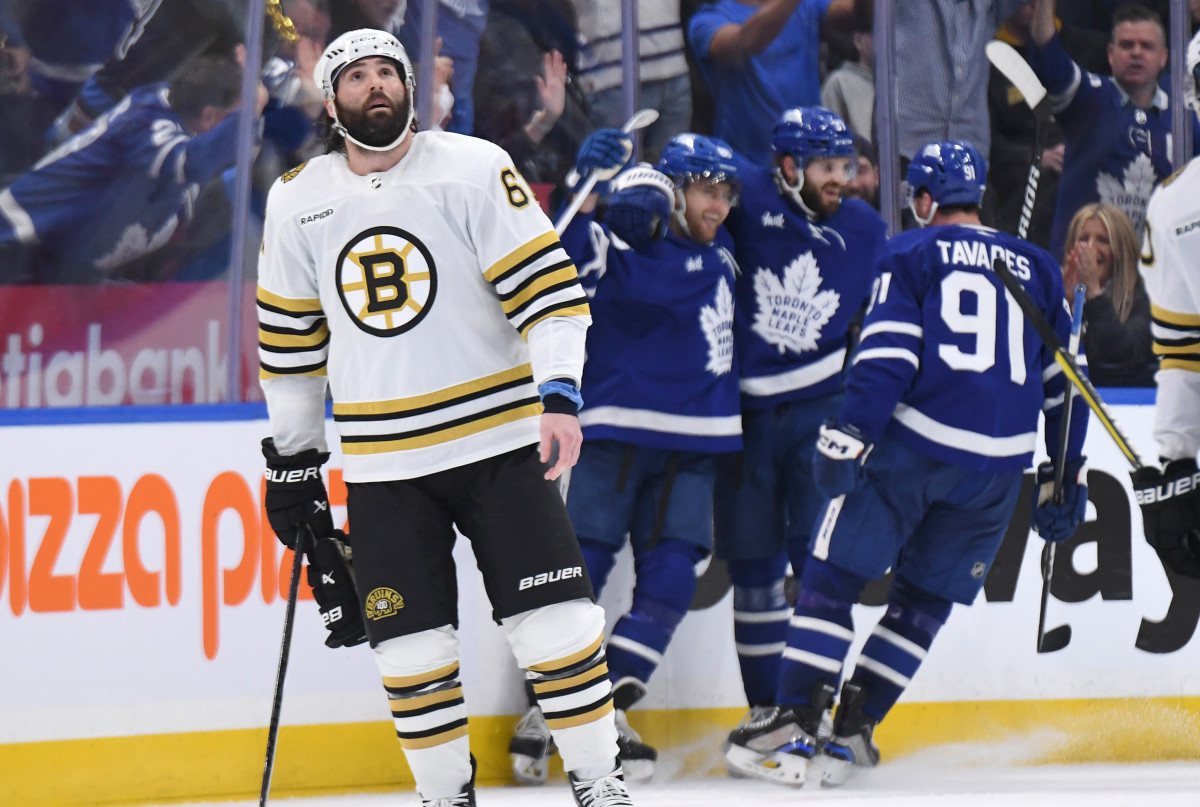It was always going to come down to Game 7. Boston and Toronto at the TD Garden one more time.
The Leafs forced Game 7 in this first round series with another gutty 2-1 win at Scotiabank Arena, their first home win of the series on the backs of strong defense, elite goaltending, and two goals from William Nylander. Without Auston Matthews for the second straight game, the Leafs dug deep to battle Boston over a 60 minute defensive struggle that featured excellent goaltending in both nets. In the end, it was Joe Woll who was able to best Jeremy Swayman and send this series back to Boston with much to digest.
Turning Points
I used this section after Game 5 to talk about Joe Woll, arguing that in a low-scoring game, each individual save is its own turning point. I still believe that to be true, so I’m running with the format again. Woll is the singular reason this series has turned on its head over the past few days. Yes, the Leafs have started on time better in Games 5 and 6 compared to 1-4. Yes, the Leafs are forechecking a bit better and killing penalties better. Yes, the Leafs are supporting Woll well. All of that is true, but given the razor-thin margins in both of these last two games and the established gap in the caliber of performance between Ilya Samsonov and Jeremy Swayman, we can also conclude that if Samsonov were still starting for the Leafs, this series would’ve ended. Whether that was in Game 6 or in Game 5, doesn’t make much difference. Woll has elevated the Leafs to another level in net.
In this game, he continued to show off his best attributes as a goalie. Woll doesn’t waste many movements and isn’t loud in net the way Samsonov is. He’s been poised, calm, and really sharp reading plays and making saves on shots through traffic. His biggest save and the truest turning point moment of the game was around 6.5 minutes into the third period when Woll was forced to flash the leather against Charlie Coyle in tight, just seconds after the Bruins had peppered the net with chances (including one that deflected off Morgan Rielly’s chest). Woll had lost his crease for a moment, got back in position, and took away the angle and space for Coyle to beat him, snaring the shot into the glove to hold the score at 1-0 Toronto.
That was the sort of game-saving save that the Leafs have needed Woll to make in order to scratch out each of these last two games. Woll was also huge for Toronto before the opening goal, particularly in the minutes directly preceding it. After he wasn’t asked to do a ton in the first half of the game, the Leafs needed Woll to come up big as Boston began to make a push late in the second period. Woll was there every time, including a couple of memorable saves against David Pastrnak’s line. He continued to be dialed in into the third period, giving Boston very little in the way of rebound opportunities and helping to slam the door.
Woll’s shutout was unfortunately ruined with 0.1 left on the clock on an odd goal just before the horn sounded, but that doesn’t change the final picture much. Woll was the biggest hero for Toronto again and seems to be finally healthy and in form for the first time since returning from the high-ankle sprain. There seems to be some consternation among Leafs fans along the lines of “Why wasn’t this guy starting earlier?” but the truth is that Woll hadn’t earned it. The team gave him every opportunity to win the job (including both games against Boston in early March) after returning from injury, but Samsonov did outplay Woll down the stretch.
Woll didn’t seem to be the same goalie who had been so good in the first half of the season, perhaps still dealing with the lingering effects of the injury. Here in this playoff series, there’s been none of that. Woll looks like the difference maker we believed he could be in November, and his playoff record dating back to last season is now spectacular: .933 SV%, 3-1 in four starts (all elimination games), a 100% QS%, and +7.29 goals saved above expected (via Evolving Hockey). Hard to beat that, and it’s erased one of Boston’s biggest advantages in this series.
Notable Performances
I saw some criticism of Mitch Marner‘s performance in this game, and while I don’t think he was sparkling, I didn’t mind his game. He drove a solid line with Max Domi and Tyler Bertuzzi that I thought generally created the Leafs’ best looks in this game offensively. They didn’t find the scoresheet and did have some moments hemmed in their own zone, but I thought they worked hard below the dots in the offensive zone, digging pucks out and flinging them toward Swayman. Better puck luck and maybe one of those finds the back of the net. Obviously, you’d love to see Marner take his game to another gear in Game 7 and really produce a signature effort, but I’ve liked these last two games from #16 after a brutal start to the series.
The line of John Tavares centering William Nylander and Matthew Knies got credit for both goals in Game 6. I thought they were decent overall — perhaps not dominant on a shift-to-shift basis, but they popped up in the big moments. Nylander’s two goals were what we’d been waiting to see from him in this series — the “playoff performer” reputation that #88 has started to garner in Toronto. His finish on the breakaway against Swayman to seal the game was sweet, but Knies’ pass there should receive tons of credit. Knies has had a very strong series with a pair of goals (including the OT winner in Game 5), the huge assist to spring Nylander, and a very noticeable, heavy presence on the forecheck. He’s learning to use his body to his advantage in the offensive zone more and has become a lot for the Bruins D to handle. It says a lot about the way Knies is playing that Tavares is clearly the third best player on that line for me right now.
The bottom six was fine, in my opinion. I didn’t have an issue with either line; they didn’t get caved in but also didn’t make much offensive impact. Nick Robertson continues to have some moments on offense but isn’t playing a ton — not enough to find the back of the net.
David Kämpf had a really strong game as an off-puck defender. The line with him, Calle Järnkrok, and Connor Dewar doing great work in their own end in the third period when it was time to put the game away. For a checking line in a playoff series, you can generally live with the outcome of “nothing happens while these guys are out there”, especially while you’re protecting a lead. Noah Gregor entered the lineup in the place of Ryan Reaves and didn’t do a ton (only played 8:21), while Pontus Holmberg laid a controversial hit on Boston defenseman Mason Lohrei. Not exactly the guy you’d expect to be blasting someone in the numbers, but it’s one way to make an impact (because Holmberg hasn’t made much of one offensively).
On defense, I thought this was a shining game from the Jake McCabe and Simon Benoit pair, which was steady late in this game. McCabe, in particular, has had a much sharper playoffs after he struggled last season (albeit next to a rapidly declining TJ Brodie), probably standing up as Toronto’s best defender in this series so far. He played 21:15 in Game 6 and has been a source of defensive stability that the Leafs can lean on in big moments, in addition to his big Game 5 goal (which he almost added to with a grade-A chance in Game 6).
Morgan Rielly continues to be lacking true “Playoff Rielly” moments and has been an issue on the power play, but he managed to grab two assists in Game 6. Neither were big time plays, but it’s worth noting. His partner, Ilya Lyubushkin, has been my pleasant surprise of the playoffs. This pair spent a ton of time in their own end in Game 6, which is definitely a problem, but most often I’ve viewed Rielly as a bigger culprit than Lyubushkin, which is a total reversal of the 2022 playoffs, when Rielly was playing well and dragging Lyubushkin, who was fighting it majorly, along with him. Lyubushkin’s reads in the neutral zone — effective at denying the line on his side of the ice — and plays with the puck have been a level beyond what I remember from the ’22 experience.
I didn’t have too many notes on the Joel Edmundson and Timothy Liljegren pair. The underlying metrics indicate that they basically broke even in terms of the territorial battle during their minutes, but I didn’t have much in my notes. Like with the checking forward line, if these guys simply don’t get scored on, it’s okay for me. I will point out that I think Liljegren has been better as the series has gone along, after a pretty rough opening that led to him getting scratched for TJ Brodie. He sent John Tavares in on a breakaway with a nice pass in Game 6 — a little more offensive involvement from Liljegren would be a much-needed development on the Leafs’ blue line.
Storylines for Game Seven
1. Auston Matthews’ health. In every single game of this series, the health of one of Toronto’s star forwards has been a point of discussion. For games 1-4, it was William Nylander, and now it is Auston Matthews. He appeared in the morning skate before this game, but he was ruled out before the game-time decision window rolled around. It seems rather up in the air whether or not he could come back for Game 7 off of whatever this unknown ailment is. Not much else to say until we know more, but it would certainly help the Leafs to add a 69-goal scorer to the lineup!
2. The power play crisis. The Leafs had six minutes worth of power plays in this game, one minor and then a double minor later on. Yet again, they were woeful. Now down to an impossible 1/20 for the series, the Leafs’ power play is laughably bad. Their first attempt at least got some possible rebound chances, but the double minor produced absolutely nothing over the four minutes of time. What’s most appalling about the state of affairs on the PP is how little has changed over the series. Their entry strategies are the same, and the personnel is mostly the same (swapping Nylander for Matthews), yet it isn’t working. Not even close.
Will they switch things up just for Game 7? Why not, you’ve got nothing to lose. I’d like to see Tyler Bertuzzi back on the top unit if Matthews doesn’t return (or even if he does, perhaps) and a move away from the drop-pass/slingshot entry because Boston has had that downloaded. I’d like to see them try to lean on their most electric skater, William Nylander, to help get it in the zone and get things set up. A swap of defensemen on the top unit wouldn’t be crazy either, given how ineffective Morgan Rielly has been there. Anything to change it up. There likely won’t be many PP opportunities in Game 7 for either side, so snapping the drought would go a long way toward advancing.
3. Improved penalty kill? After getting ravaged on the PK through four games, the Leafs have gone two straight without giving up a PPG. The Bruins haven’t had many opportunities in either game, with only one in this one, but the kills have looked sharper. This one in Game 6 was very solid, Woll doing what he needed to, but the Leafs disrupting plays and battling hard. They’ve been much better, more aggressive PK efforts than earlier in the series and they need to carry that forward into Game 7. I trust that the 5v5 defense and goaltending can hold up. If the PK does its job, they can hold the Bs to 0 or 1 like they have the last two games, which gives you a very strong chance of winning.
4. Pressure is on Boston now. The Bruins are continuing to follow the exact same script as last year’s series against Florida. Win at home, lose G2 at home, sweep the road games, lose G5 in OT at home, and lose G6 on the road. What happened in Game 7? They lost at home. If the Bruins lose on Saturday night, they will be the first team in NHL/NBA/MLB history to blow a 3-1 series lead in consecutive postseasons — a truly historic choke. To have that happen would be devastating; to have it happen against the Maple Leafs, the one team they’ve historically owned in the playoffs, would be unforgivable.
I don’t know what the real temperature is on the situation, but I wonder if Jim Montgomery could be coaching for his job, or at the very least for the right not to be attacked by a mob outside TD Garden when he retrieves his car after the game. As for the Bruins as a team, their playoff history is not nearly as sterling as Leafs fans who have had Boston embedded in their brains would believe. As I’ve always said, no team in NHL history has gotten more narrative mileage out of a single game than Boston did by winning Game 7 of the 2011 Stanley Cup Final in Vancouver.
Outside of that game, the Marchand-era Bruins are one of four teams in history to blow a 3-0 series lead, are 0-2 in their other Finals appearances including a stunning dud on home ice in 2019’s Game 7, have won the Presidents’ Trophy twice yet failed to reach the third round either time, and now are one game from becoming the first team ever to blow back-to-back 3-1 series leads. If the Bruins hadn’t prevailed on that one fateful June evening in British Columbia, they would be remembered as the greatest playoff chokers of the 21st century, supplanting the Sharks. They will always have that win and that 2011 team should rightly be remembered as champions, but the Leafs have an opportunity to tack on a much smaller choker label to Boston’s mantle if they can finish this off on Saturday.
5. Here we are again. For the fourth time in 12 seasons, the Toronto Maple Leafs and the Boston Bruins will do battle in Boston for a Game 7 of the opening round. As everyone knows, the Bruins are 3-0 in those games, the one team they can regularly own in the playoffs. Only Marchand is left from that first one back in 2013, but several are left from the 2018 and 2019 meetings. The Leafs have the opportunity to finally slay the dragon on the only stage fitting of doing so, in the past house of horrors.
The Leafs are also, as is well known, historically terrible in winner-take-all games. They lost G7 (or G5 in 2020’s bubble) in five straight playoffs from 2018 to 2022. They are yet to win one in the Matthews/Marner era. They are long past due to finally break through and thankfully, as noted in point #4, the pressure is on Boston. This crazy series that saw so many draft obituaries for the Leafs’ season after Game 4 has concocted the only script where it’s the opponent and not the Leafs facing immense pressure going into a Game 7.
The last two times the Leafs were in this situation, they were coming off crushing OT losses in Game 6 that dampened the mood going in. This one is much more like 2018’s, when the Leafs fought back in G5 and G6 to force a seventh game, with all the momentum and nothing to lose. The Leafs led by one after two periods that year and couldn’t finish it off. Now’s the time to do it.















![John Gruden after the Leafs prospects’ 4-1 win over Montreal: “[Vyacheslav Peksa] looked really comfortable in the net… We wouldn’t have won without him” John Gruden, head coach of the Toronto Marlies](https://mapleleafshotstove.com/wp-content/uploads/2025/09/gruden-post-game-sep-14-218x150.jpg)


















